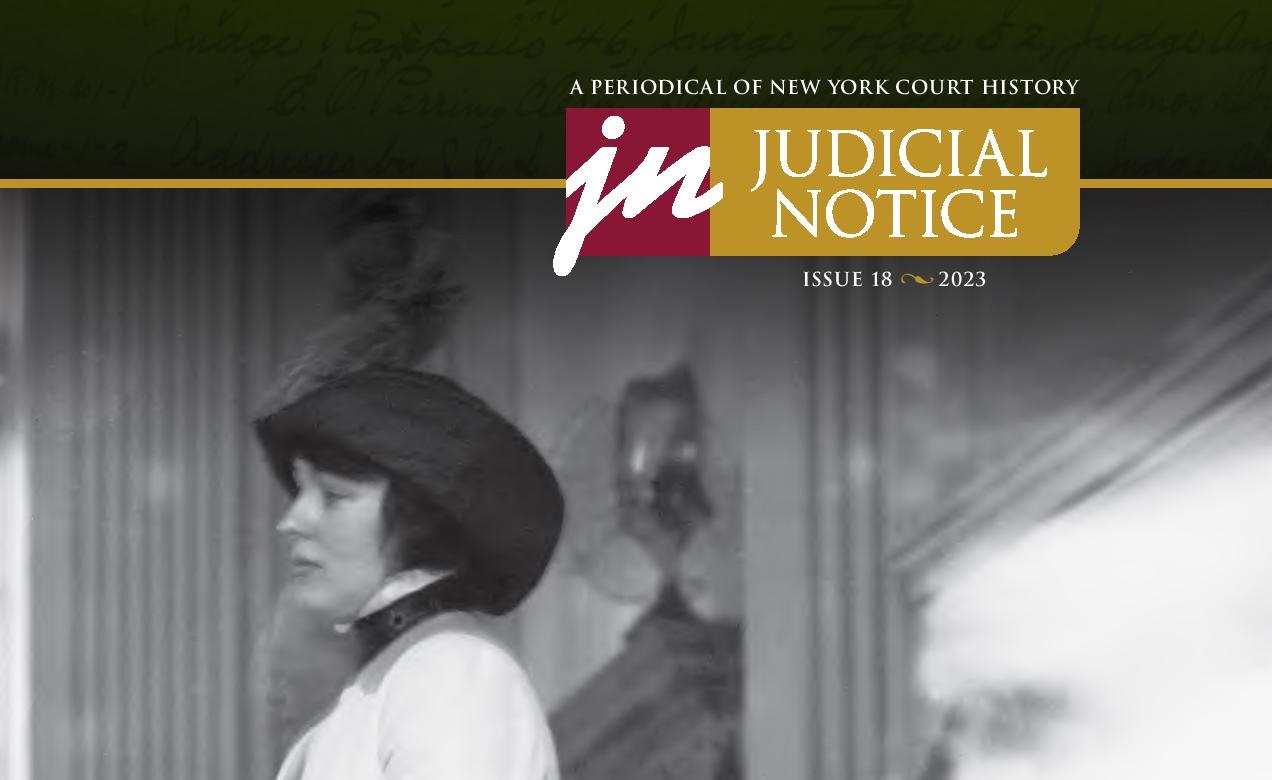Issue 18 of Judicial Notice is now arriving on our members’ doorsteps. This issue features articles about important New York legal figures and judges, fascinating cases, and a Cardozo speech that hasn’t been published since he originally gave it!
Soon we will be restarting our Chatting with the Authors podcast series with Communications Strategy Fellow Dr. Eric van der Vort as the host. We’ll discuss the authors’ interests in their topics and behind-the-scenes stories that didn’t make the cut in the article. Read on to learn more about the issue with the Hon. Helen E. Freedman’s Letter from the Editor in Chief.
Judicial Notice 18 articles take us back to New York events occurring in the latter part of 19th and early part of the 20th centuries. Judge Richard A. Dollinger describes the intersection of the lives of two diametrically opposite characters in Western New York: John Hazel, the old line G.O.P. loyalist who, in 1900, became the first Judge from the newly created federal district court for Western New York, and Emma Goldman, the famous if not notorious Russian immigrant and anarchist. Judge Hazel presided over the trial and sentencing of Leon Czolgosz, President William McKinley’s assassin. Czolgosz claimed to have been influenced by the work of Emma Goldman, making her seem to be an unindicted co-conspirator, although the two never met and Goldman decried his act.
Professor Mary Noe recounts the amazing story of Harry Thaw, socialite and assassin of renowned architect Sanford White. Thaw, the scion of a wealthy New York family, was prosecuted twice for murdering White, but it seems the lawyers and judges involved in the prosecution ended up in as much trouble as did the defendant. In the second trial, his insanity defense prevailed, but Thaw was committed to Matteawan State Hospital until he was able to prove he was no longer insane.
Your editor has written an article about Samuel J. Tilden, a distinguished New York lawyer, governor, and statesman, who won the majority popular vote for president in 1876 and who could have rightfully claimed that the election was stolen; but who sought for the sake of the country not to challenge the result. Breaking up the notorious Tweed Ring and assuring the establishment of the New York Public Library are but two of things for which Tilden should be remembered.
Although Judicial Notice has already featured a number of articles about New York Chief Judge and United States Supreme Court Justice Benjamin N. Cardozo, it seems there will never be too many.
Former Judicial Notice Editor and State Bar President Henry M. (Hank) Greenberg provides what he aptly describes as an “inspiring tribute” in Washington, the Constitution Builder, that Chief Judge Cardozo delivered in 1932, one week after having been nominated by President Herbert Hoover to the United States Supreme Court. The speech was part of an Albany celebration of the 200th anniversary of George Washington’s birth. Given during the heart of the Great Depression, it resounds with meaning for us today. In a short accompanying article, Greenberg speaks about Cardozo’s significant extra-judicial writings that have contributed mightily to our understanding of American common law and jurisprudence and the development of the Rule of Law as a cornerstone of democracy.
In the “Angle of Repose,” Professor John Q. Barrett describes a letter written in 1948 between Jacob Billikopf, an immigrant who became a prominent social worker, and Edward Lazansky, a first generation American who became a successful New York lawyer, New York’s Secretary of State, and Presiding Justice of the Second Department. Both, as young Jewish men during the turn of the century, had become friends and admirers of Judge Cardozo. In the letter, written ten years after Cardozo’s death, Lazansky assures Billikopf that the scholarly and judicial Cardozo also possessed a dry wit. It was demonstrated when Cardozo tried to enlighten a colleague about a case involving a bulkhead in Jamaica Bay and Mill Basin in New York. Professor Barrett followed up with a scholarly description of the actual case, which may be of particular interest to maritime lawyers.

